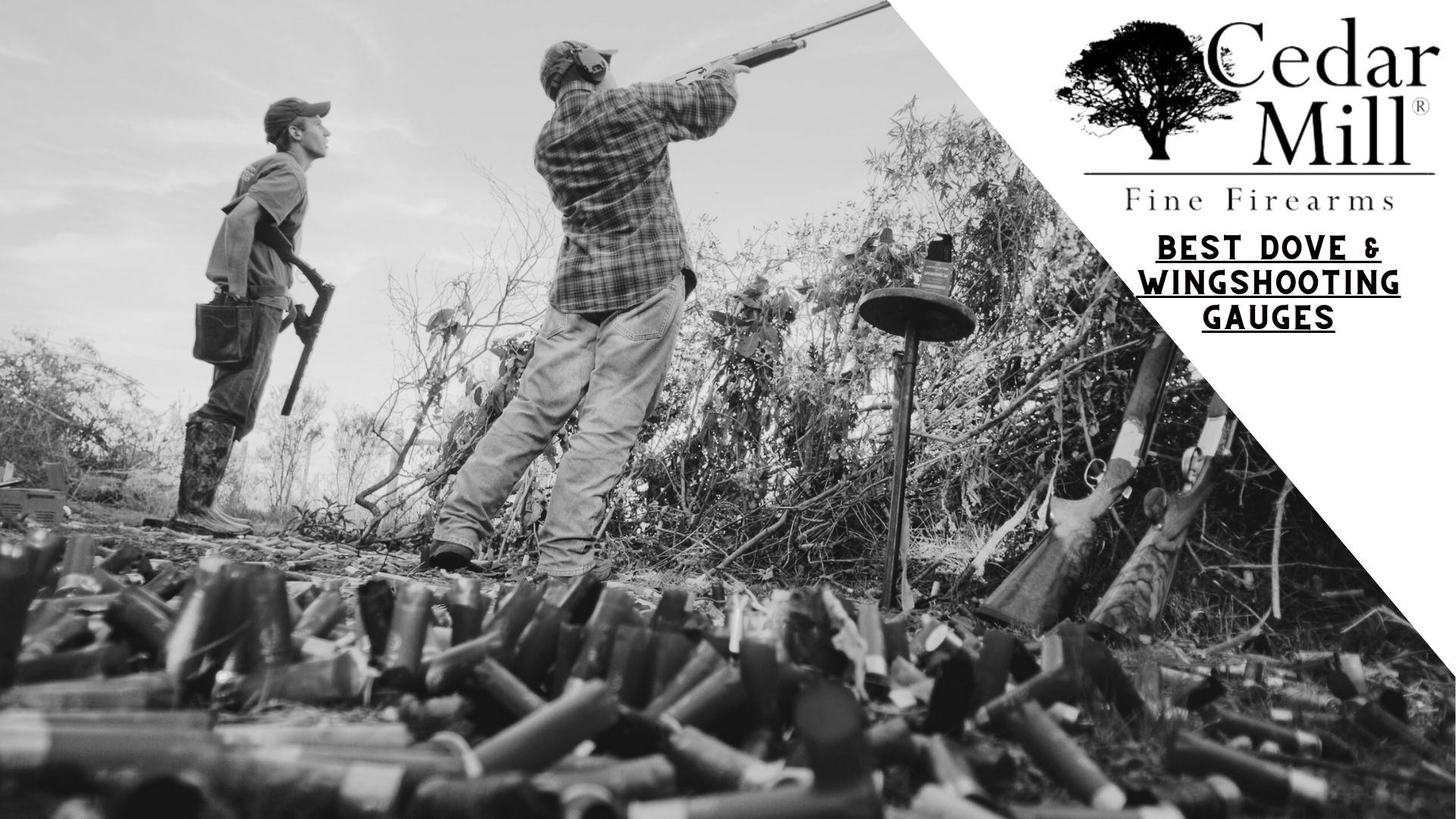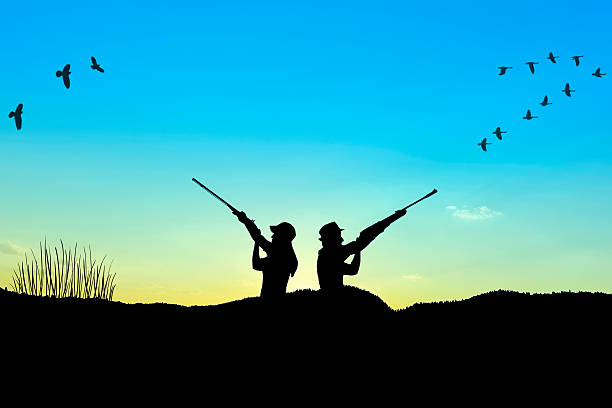What is the Best Gauge Shotgun for Dove Hunting and Wingshooting?
Posted by Mandu Moses on Oct 1st 2024

In the world of wingshooting, dove hunting is well known as one of, if not the, the most exciting and rewarding forms of hunting.
As a hunter, it’s an amazing test of your accuracy and skills—requiring precision, timing, and the proper gear to have a successful hunt. Selecting the correct shotgun gauge is one of those important aspects, dramatically impacting your performance and chances for good shooting in the field.
Today, we will explore the different gauges commonly used for dove hunting, their pros and cons, and help you determine which is the best fit for your wingshooting needs.
Introduction to Dove Hunting and Shotgun Gauges
Dove hunting is a relatively fast-paced task where your targets are extremely small and often move in an unpredictable manner. This makes it very important to have a shotgun that not only suits your personal shooting style, but also gives you the best chances of hitting your mark.
One important aspect of your shotgun and the highlight of our conversation today is the shotgun gauge, which refers to the bore size of the firearm. This directly influences factors such as recoil, shot pattern, and overall handling.
For dove hunting, the most popular shotgun gauges include the 12-gauge, 20-gauge, 16-gauge, and 28-gauge shotguns. Each option has its own unique attributes that can either work in your favor or against you, depending on the conditions of the hunt and your personal preferences.
What are the Differences in Shotgun Gauges?
When discussing shotgun gauges, the larger the gauge number, the smaller the bore. This plays an essential role in determining the spread of the shot, power, and recoil.
Next, we’ll dive into the four aforementioned options recommended for dove hunting:
12-Gauge
The most versatile and commonly used gauge in wingshooting, the 12-gauge is a powerful and reliable option, offering a large spread and good power at longer ranges. While the recoil can be a nuisance on extended hunts, you might need the extra range while hunting in more vast areas, like wingshooting in Argentina or some of the bigger Texas hunting grounds.
20-Gauge
This is a popular choice for dove hunting due to its balance between manageable recoil and effective power. It’s lighter than a 12-gauge, making it easier to carry for long periods without sacrificing shooting performance.
28-Gauge
Known for being more lightweight and easy to handle, the 28-gauge offers minimal recoil, making it perfect for hunters who prioritize comfort. However, it does not pack quite the same punch as a 12 or 20-gauge, and ammunition can be harder to find.
16-Gauge
Once a popular gauge, the 16-gauge has become less common as of late. It sits between the 12 and 20-gauge in terms of power and recoil, but its rarity makes ammunition expensive and harder to come by.
Pros and Cons of Each Gauge for Dove Hunting
Now, each gauge has its own advantages and drawbacks, making it important to evaluate your specific needs before making a decision.
12-Gauge
20-Gauge
28-Gauge
16-Gauge
Shotgun Actions for Dove Hunting: Semi-Auto, Pump, or Over/Under?
Choosing the right shotgun action is another key decision when it comes to your dove hunting shotgun. Shotgun actions influence how quickly and easily you can take follow-up shots, which are often needed for most wingshooting scenarios.
Semi-Automatic
A favorite for dove hunters, semi-automatic shotguns allow for super quick follow-up shots without having to manually cycle the action. This type of shotgun also tends to reduce recoil, making it an excellent choice for fast-paced dove hunts.
Pump-Action
Pump-action shotguns are highly reliable and can often handle different types of ammunition. However, the manual cycling of the action can be slower and more cumbersome in fast-shooting situations.
Over/Under
Lastly, over/under shotguns offer precision and reliability with two barrels, allowing for two quick shots before needing to reload. While they’re great for accuracy, their two-shot limitation may put hunters at a disadvantage compared to semi-automatics in situations where there are more than 2 birds to shoot, or if you miss your first shot.
Factors to Consider When Choosing a Gauge for Dove Hunting
Next, there are several other factors that come into play when selecting the best shotgun gauge for your dove hunt.
Hunting Style
You must consider your shooting style, the distance at which you’ll be shooting, and the environment in which you are hunting. In more open fields, a 12-gauge may provide the extra range and spread you need, while a 20 or 28-gauge may be ideal for closer-range shooting in tighter spaces.
Physical Tolerance
If you’re someone who tires quickly or is sensitive to recoil, it might be best for you to go with a lighter gauge like the 20 or 28-gauge, as it will be more comfortable for long days in the field.
Ammunition Availability
The more common the gauge, the easier it is to find and purchase ammunition. 12-gauge shells are the most widely available, followed by 20-gauge. Both the 16 and 28-gauge options can be harder to source and more expensive.
What are the Best Shotguns for Each Gauge?
Now that you have a better understanding of gauge options, we’ve taken the liberty to dive into a couple good options for each.
Based on the strengths of each gauge, here are some top shotgun recommendations for dove hunting:
12-Gauge
Browning Maxus II
Known for its smooth cycling and low recoil, perfect for long days in the field.
Remington V3 Field Sport
A versatile semi-auto that balances performance with ease of use.
20-Gauge
Benelli Ethos
Lightweight and reliable, offering superior handling in the field.
Winchester SX4
Another semi-auto that’s perfect for dove hunters who want quick follow-up shots and low recoil.
28-Gauge
Browning Citori CXS
A beautifully crafted over/under shotgun, ideal for precision shooting.
Franchi Instinct L
A well-balanced, lightweight option that’s great for hunters seeking minimal recoil.
16-Gauge
Browning A5 Sweet Sixteen
A reliable choice for hunters who want the versatility of a 16-gauge without sacrificing performance.
Shot Size and Choke Selection for Dove Hunting Success

Credit: canaran
Selecting the right shot size and choke combination is very important for being as accurate and successful as possible on a dove hunt. For shot size, #7.5, #8, or #9 are commonly used as they provide the right balance of spread and pellet count to effectively take down doves without causing too much damage.
When it comes to chokes, the Improved Cylinder and Modified Choke are the most popular choices for dove hunting and wingshooting. These chokes provide a solid combination of spread and range, allowing you to take both close and mid-range shots with confidence. Also, while it might seem redundant to say, it is extremely important to make sure you properly clean and maintain your shotgun, no matter what gauge or choke you go with.
What are Shooting Techniques for Effective Wingshooting?
To excel in wingshooting, mastering the right techniques is essential as well, on top of having a good shotgun.
The swing-through and sustained lead methods are both effective approaches used by hunters around the world. Swing-through involves starting your aim behind the bird and swinging through it as you fire. Sustained lead requires keeping the gun moving ahead of the bird’s flight path.
Consistency is key here; keep your movements smooth, time your shots well, and maintain focus. Regular practice and understanding how to adjust for varying flight patterns will significantly improve your accuracy.
What's the Right Gauge for Your Needs?
In the end, the best shotgun gauge for dove hunting comes down to personal preference, shooting style, and the specific conditions of your hunt.
For many, the 20-gauge strikes the perfect balance of power, weight, and recoil. If you’re new to wingshooting, it’s a solid choice.
However, experienced hunters may find the versatility of 12-gauge appealing, while others might prefer the lightweight 28-gauge for its ease of use. Try different guns and gauges if possible, and find the one that feels best suited to you for an enjoyable and successful hunt.
